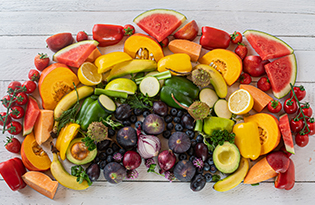Want to ease chronic inflammation? Start with your grocery list
11/4/2021 by Rose Prissel, M.S., R.D.N., L.D.

Flip through a magazine or scroll through your news feed, and you'll probably see a story about anti-inflammatory foods. But why is inflammation bad, and what does food have to do with it?
Inflammation is a part of the body's normal response to infection or injury. It's when damaged tissue releases chemicals that tell white blood cells to start repairing. But sometimes inflammation is low-grade, spreads through the body and is chronic.
Chronic inflammation can damage the body. It can play a role in the buildup of plaque in your arteries, increasing your risk of heart disease and stroke. It's also associated with a higher risk of cancer, diabetes and other chronic conditions.
How food can hurt or help
The choices you make at the grocery store can affect the inflammation in your body. While scientists are still unraveling how food affects inflammatory processes, they know a few things:
- Some foods, like processed sugars, release inflammatory messengers that can raise the risk of chronic inflammation.
- Other foods, like fruits and veggies, help the body fight against oxidative stress, which can trigger inflammation.
- Foods that are anti-inflammatory tend to be the same foods that can keep you healthy in other ways.
Add more of these foods to your grocery list
Choosing foods to reduce chronic inflammation has layers. Specific components in food work together to reduce inflammation. That's why no one food makes your diet anti-inflammatory. It's the sum of the foods you eat every day.
Overall, eat a rainbow of fruits, veggies, whole grains and legumes — all of which have the anti-inflammatory nutrients that your body needs. Fresh, simple ingredients are best, since over processing can significantly change the nutritional content of foods.
You can start building an anti-inflammatory grocery list by choosing:
- Deep orange, yellow and red, and dark green foods, such as pumpkin, sweet bell peppers, tomatoes, carrots, kale, spinach, Swiss chard, arugula and endive.
- Cruciferous vegetables such as broccoli, cauliflower and cabbage.
- Onions.
- Citrus fruits, such as oranges, grapefruit and pomelos.
- Whole grains, such as wheat, oats, rye, buckwheat, millet, quinoa and brown rice.
- Plant-based proteins, including dried beans, lentils, lentil pasta and soy.
- Nuts and seeds, including walnuts and almonds, and seeds like chia, flax and hemp.
- Spices and herbs, including ginger, garlic, turmeric, cardamom, black pepper, cinnamon and rosemary.
- Beverages such as water, herbal and green teas, and coffee.
Trim these foods from your list
Gradually reduce inflammation-promoting foods from your daily meals by trimming these foods from your grocery list, while trying some alternatives:
- Refined carbs, such as white bread, rice, pasta and pastry. Try mixing white and brown rice, white and whole-wheat pasta, or sweet with unsweetened cereal.
- Fried foods, such as french fries, chips and donuts. Bake your own french fries with the skin, try kale chips or use an air fryer.
- Sugar-sweetened sodas, fruit drinks, sweetened teas and flavored coffees. Replace with sparkling mineral water, infused water, unsweetened tea and coffee.
- Processed meats, such as hot dogs, sausage, brats and red meat. Try meatless meals or use meat as a side dish rather than a main dish.
Building meals with your new grocery list
These ideas can help you start building meals with anti-inflammatory foods:
- Breakfast
Start the day with oatmeal with berries, an apple or a fruit smoothie. - Lunch
Toss together a salad of dark greens, colorful fruits and vegetables, topped with beans and nuts or seeds. - Dinner
Fill half your plate with colorful vegetables, a quarter in whole grains and the other quarter with a lean protein.
Foods aren't the only way you can reduce inflammation in the body. Boost the results of your diet by maintaining a healthy body weight, since weight loss on its own is anti-inflammatory. Also, get in 30 minutes of daily physical exercise and manage stress.
Rose Prissel, M.S., R.D.N., L.D., is a dietitian in Primary Care in Rochester and Kasson. She works in pediatric and adult nutrition, focusing on preventive care, sports nutrition and weight management.
